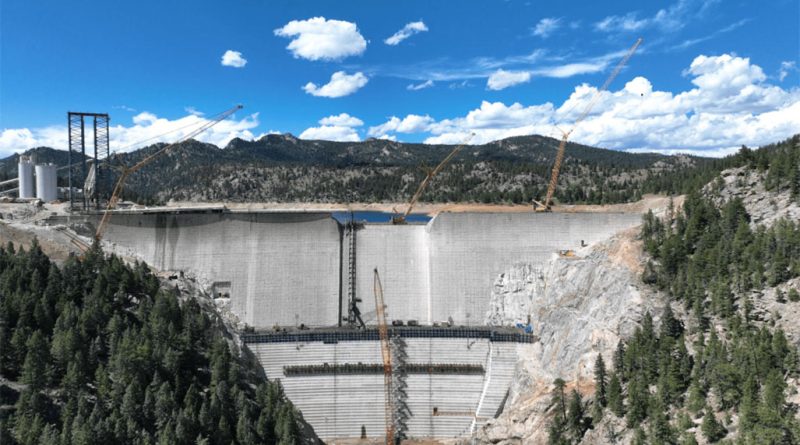Denver Dam Expansion Halted Amid Federal Permit Controversy
Subscribe to our free newsletter today to keep up-to-date with the latest construction news.
Denver Water’s $531 million Gross Dam expansion has come to a sudden stop after a federal court ruling found that a key construction permit had been wrongly issued. The decision, issued by U.S. District Judge Christine Arguello, halts all progress on one of Colorado’s largest dam projects. The move comes as a significant blow to Denver Water, which had completed nearly 60 percent of the work and described the expansion as critical to supplying 1.5 million residents across the metro area.
The project aimed to raise the 340-foot Gross Dam by another 131 feet, increasing the reservoir’s capacity from 42,000 to 119,000 acre-feet. Denver Water framed the expansion as essential to strengthening the city’s water supply against future droughts and extreme weather events. However, the judge determined that the U.S. Army Corps of Engineers failed to fully assess environmental impacts and did not consider feasible alternatives before issuing the permit.
The permitting controversy behind the stoppage
At the center of the ruling is a longstanding dispute over how thoroughly federal agencies evaluate infrastructure projects under environmental law. The U.S. Army Corps of Engineers issued a dredge-and-fill permit in 2017 under the Clean Water Act, allowing the reservoir expansion to proceed. Environmental organizations contested the permit, citing an incomplete review process under the National Environmental Policy Act.
Judge Arguello’s decision found that the Corps had not adequately examined alternative solutions for meeting Denver’s water demand. The court also highlighted that the agency failed to fully evaluate the environmental consequences for surrounding ecosystems and downstream communities.
Permitting efforts for the expansion began in 2002 and spanned more than 15 years. Despite the extensive process, legal challenges emerged soon after construction approvals were granted. Initial lawsuits were dismissed due to jurisdictional questions, but a federal appeals court later revived the case. With the latest ruling, the judge sided with plaintiffs who maintained that the Corps had not complied with federal standards for environmental assessment.
The role of advocacy groups and growing legal momentum
The lawsuit was led by Save The Colorado and supported by other advocacy organizations, including Waterkeeper Alliance. These groups have long opposed the project, arguing it would cause significant ecological harm and further strain the Colorado River Basin. They pointed to gaps in the Corps’ analysis and argued that more sustainable alternatives were never seriously evaluated.
Gary Wockner, director of Save The Colorado, criticized Denver Water’s decision to proceed with construction amid unresolved litigation. He said the utility took unnecessary risks with public funds and emphasized the need for a collaborative path forward that considers environmental priorities.
Judge Arguello’s ruling has been praised by environmental advocates who view it as a critical step in reinforcing accountability for large infrastructure developments. Legal experts suggest the decision could set a precedent for future challenges to federally approved water projects, especially where agencies are seen to have neglected comprehensive review.
Broader water implications across the Colorado River Basin
Although focused on a single project, the ruling has wider significance for water policy across the western United States. The Gross Dam expansion was intended to support growing demand in the Denver metro area, but its location within the broader Colorado River Basin placed it under regional scrutiny.
The Colorado River serves more than 40 million people across seven states. Years of drought and overuse have pushed the river to critical lows. Environmental organizations warned that expanding upstream storage could reduce water flow downstream, compounding shortages for agricultural regions and urban centers that rely on the basin.
Tensions among the basin states have grown more acute as they attempt to renegotiate water-sharing agreements. The decision to halt Denver’s project is seen by some as a chance to reconsider water allocation priorities and place greater focus on conservation, reuse, and decentralized water systems.
Contractors, construction delays, and financial implications
Construction of the expansion was managed by a joint venture between Kiewit Corporation and Barnard Construction Company. The two firms had begun dismantling the original dam structure and were preparing to rebuild it as an arch dam with greater capacity and improved design features.
With 60 percent of the project completed, the court order brings logistical and financial uncertainty. Denver Water faces rising legal costs, potential redesigns, and project management complications. Ensuring the safety of a partially modified structure adds another layer of technical risk and financial burden.
Although the court left room for limited activity to continue, the broader work remains paused. Public utility leaders are concerned that indefinite delays may increase overall costs and extend the project timeline well beyond the original 2027 target. Ratepayers could ultimately bear the cost of this legal and administrative setback.
This case joins a growing list of projects slowed or halted by litigation over environmental permits. Courts have signaled a stronger willingness to examine whether agencies have followed due process, particularly for projects affecting watersheds and habitats.
Sources:
